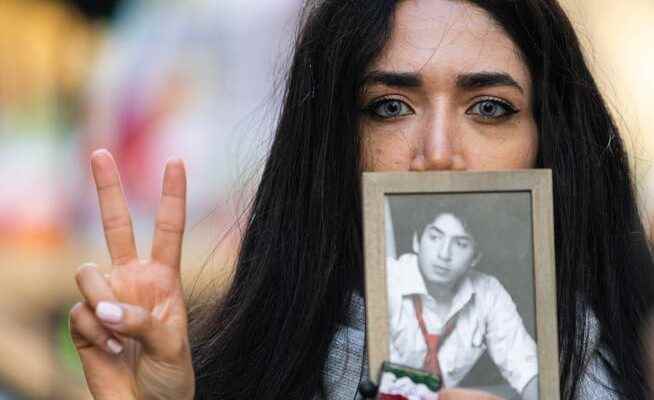The arrest of Mahsa Amini for allegedly indecent clothing by the vice squad and her death sparked protests in Iran. For the time being, however, the suspension of the unit does not change anything about the compulsory hijab.
The protest movement in Iran has claimed hundreds of lives. One of the victims is Majid Mokhtari, whose photo is being shown at a solidarity rally in Washington.
For almost two decades, they made life hell for Iranian women: the religious and moral police. Whenever the virtue guards caught women in public spaces whose headscarves had slipped down too far or who were wearing trousers that were too tight, they were dragged to a police station, humiliated and often beaten.
On September 16 fell Mahsa (Zhina) Amini fell into the clutches of moralizers during a trip to Tehran; the young Kurd died three days later. Since then, women and men have taken to the streets and demanded an end to compulsory headscarves and more individual freedoms. Now the hardliners have moved for the first time and made a concession to the protest movement.
State media show women without headscarves
The Attorney General Mohammed Jafar Montazeri said at the weekend that the “training patrol”, as the special unit is officially called, had been suspended. It has nothing to do with the judiciary and was dissolved by the same institution that created it. This was reported by Iranian media on Sunday. The announcement came casually on the sidelines of a conference on Saturday, where an attendee asked about the reasons for the disbanding of the unit.
The special unit was launched in 2005. The then President Mahmud Ahmadinejad wanted to put a stop to the liberalization of the compulsory covering initiated by the reformer Mohammed Khatami. According to the law, it reports to the Supreme Council for the Cultural Revolution – the Iranian leadership sees the proclamation of the Islamic Republic in 1979 to this day as an ongoing revolution. The Council itself reports to President Ebrahim Raisi, a hardliner.
It remains to be seen whether the moral police will actually be dissolved. Neither Raisi nor other senior officials have commented on Montazeri’s announcement. It is also questionable whether the protest movement will be satisfied with this. In fact, the guardians of morals had largely disappeared from the public image in recent weeks. Women demonstratively walked the streets or markets without a headscarf, without the security forces lifting a finger. Even state media recently showed pictures of women with bare heads.
The hijab compulsion still applies
The protests affected so broad circles of society that the Iranian leadership had to react. Well-known actresses, theater professionals, even conservative circles and footballers, including members of the national team, have shown solidarity with the demonstrators. In view of this, the leadership is concerned with releasing pressure in some way and possibly splitting the movement.
The judiciary will of course continue to monitor the behavior of society, said Attorney General Montazeri. But both Parliament and the judiciary would discuss the issue of compulsory hijab. A decision should be made in the next two weeks. It is quite unlikely that the hardliners, who also control parliament, will abolish the obligation to cover up. This one has been in since 1983 the Constitution established and forms one of the pillars of the Islamic Republic. However, there are methods of “flexibly” enforcing the constitution, said Raisi at an appearance on state television.
Raisi and other officials are trying to denigrate the protesters as rioters controlled from outside. Thousands have already been arrested, including actresses, musicians and well-known activists. They are to be tried, at least six men have already been sentenced to death in the first instance. Four men who had been convicted a few months earlier of allegedly spying for Israel were executed over the weekend, the judiciary said. Even if they had nothing to do with the current protests, it is a clear threat to the demonstrators.
The protesters want more than just the abolition of the hijab requirement
The police, the Basij militia and some members of the Revolutionary Guard are cracking down on the mostly young protesters in many places. The authorities now admit that 200 people were killed, including members of the security forces. Human rights organizations, however, assume a much higher number of victims. Several Organizations based in exile speak of more than 400 dead and thousands injured.
If the moral police are actually abolished, it would be an enormous success for the protest movement. She would have achieved that the hardliners, who wanted to tighten the hijab compulsion in the summer, could not continue as before. However, the fact that they have to back down on one point could whet the appetite for more. Many who are currently risking their lives want more. They are demanding fundamental reforms, not a few even the overthrow of the regime.
